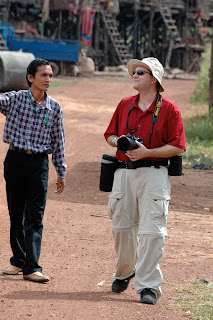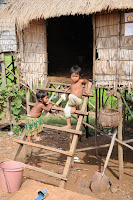To My Students (Wat Bo’s teachers),
I had a lot of fun in Siem Reap. Your gifts were very kind. The shirt, the scarf, and the
Apsara dancer statue were all very nice. Thank you from the bottom of my heart. I miss you all very much. Please tell
your students, the kids, in the English classes that Mr. Tom says hello and misses them, too!
I appreciate all your email letters. It is a good way for you to practice your English. Keep your messages coming. I like getting messages from friends.

A few of you have asked about my job. I work at
Tidewater Community College in
Norfolk, Virginia (America). For my job, I build web pages on the Internet. I am including two pictures of me at work for you to see. The first one is me at my desk, and the second is me working with Ruth, the Assistant Webmaster. Together, we are a department called
Web Services. Ruth deserves a big “thank you.” Without her running the department while I was in Cambodia, I would not have been able to leave my job to teach you about email, and the Internet.

My job is at a school, but I do not teach students. I am part of the staff that makes the school run, like the Director and Vice Director at Wat Bo. Also, Tidewater Community College is a college, which is different than Wat Bo School. At Wat Bo School, you teach students in kindergarten through grade 6. Tidewater Community College teaches grades 13 and 14. From Tidewater Community College, students can go on to University, or grades 15 to 20 and beyond.
I told some of you that I am a student studying at University. My University is the
College of William and Mary. I am studying for a master’s degree, or grade 18. I will graduate in December of 2009, hopefully!

The College of William and Mary, and my teacher
Dr. Don Rahtz, are who you should thank for buying the Internet connection for Wat Bo School. The Internet connection at Wat Bo School costs US$ 150 per month you know! It is very expensive, so be sure to thank Dr. Don and the College of William and Mary, too.
Also, you asked about my dog. I told you all how much I missed him. You know my dog is like my son! I posted his picture here so you can see him. His name is Caesar. He is three years old. I had him since he was a little puppy, just 5 months old. His birthday was 30 June. I was with you in Cambodia then, so I missed his birthday this year. It is okay. We celebrated it this weekend.

Keep practicing using the computer. If you have questions, see Tong So Chea! He can help you because he is very good at computers. You can also email your questions to me.
Do not forget that I showed you how to chat with me, so in the morning in Cambodia (between 9:00 and 11:00 a.m.) you may see me online in the Yahoo! chat. We can even try to video chat using the web cam I set up for you.
I hope that I can see you again someday. Please take care of yourselves, and stay in touch with me.
Kind Regards,
Tom Feist
















